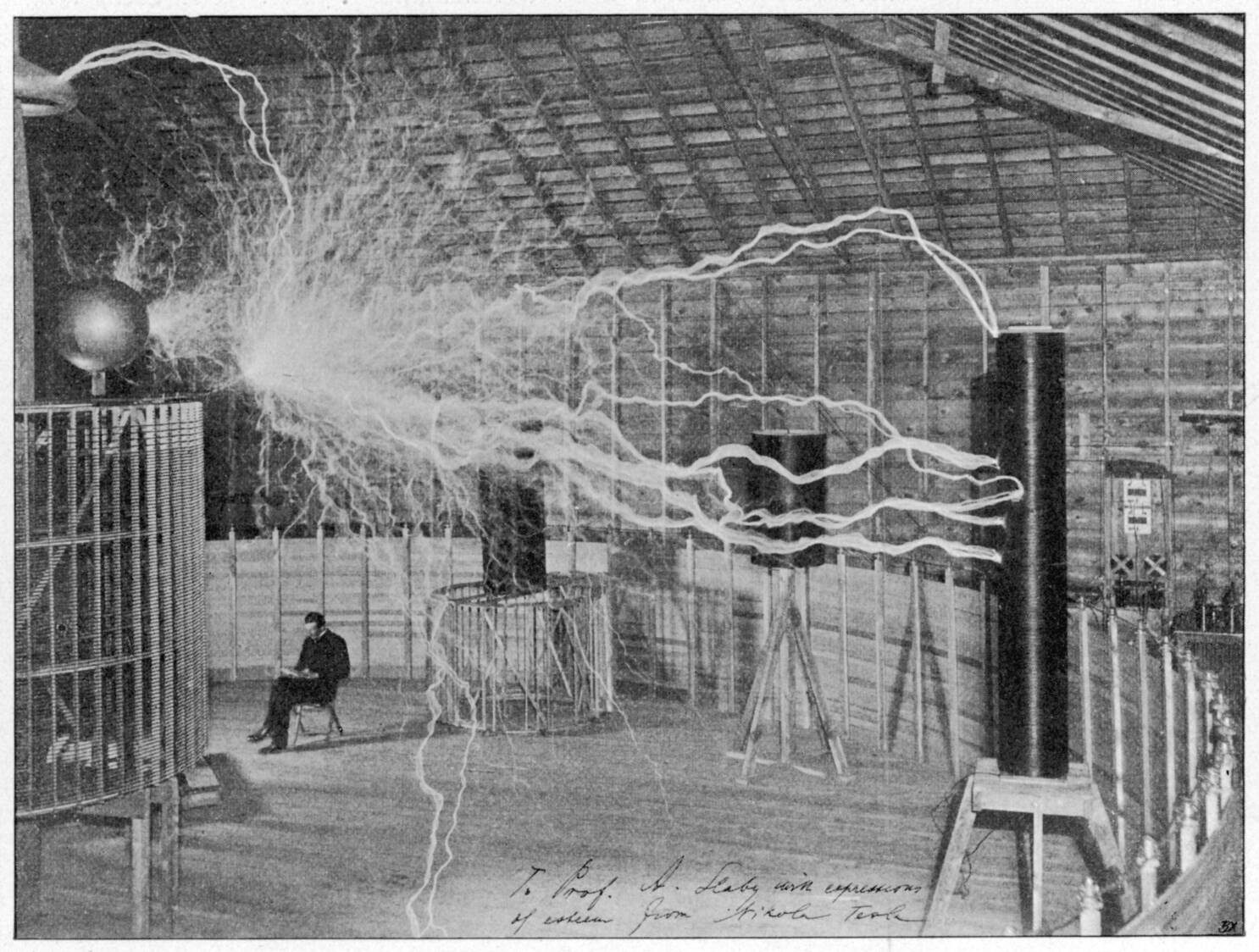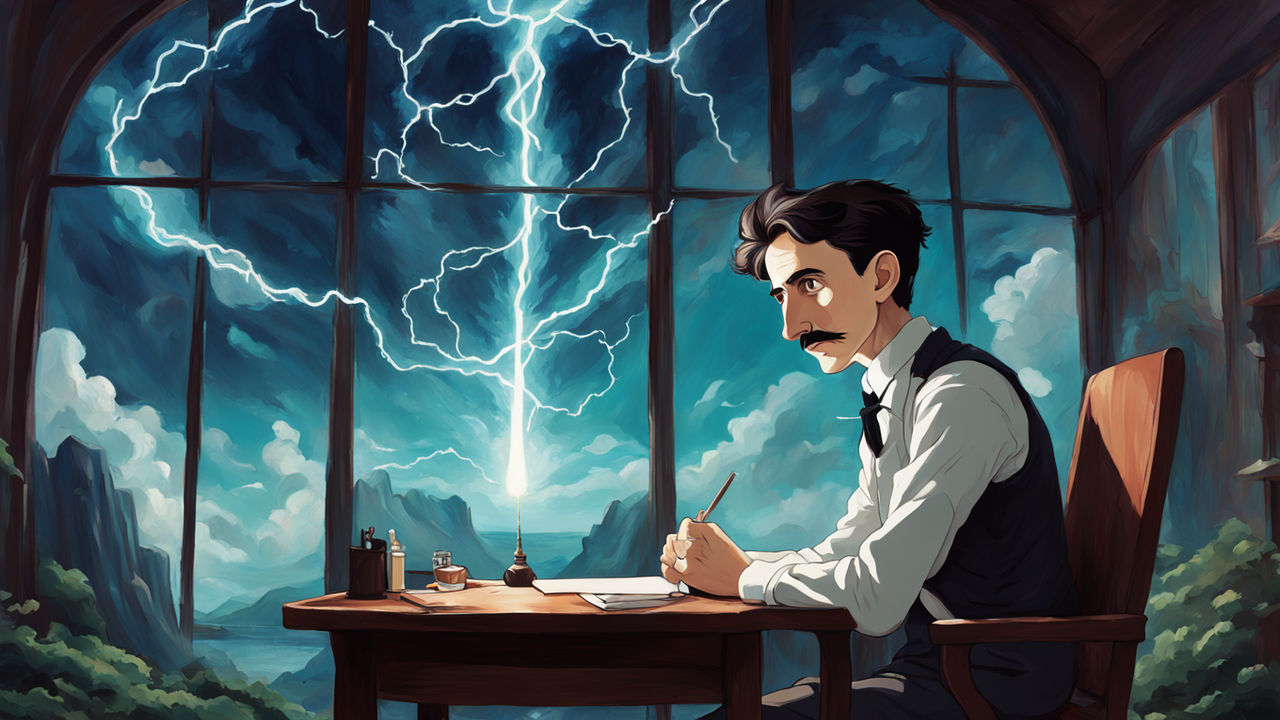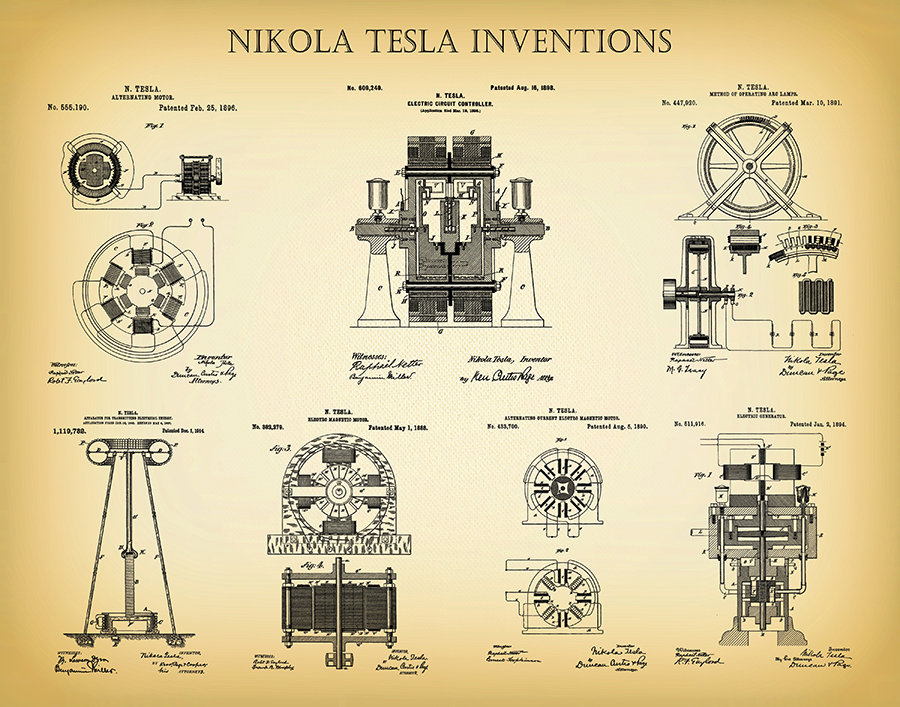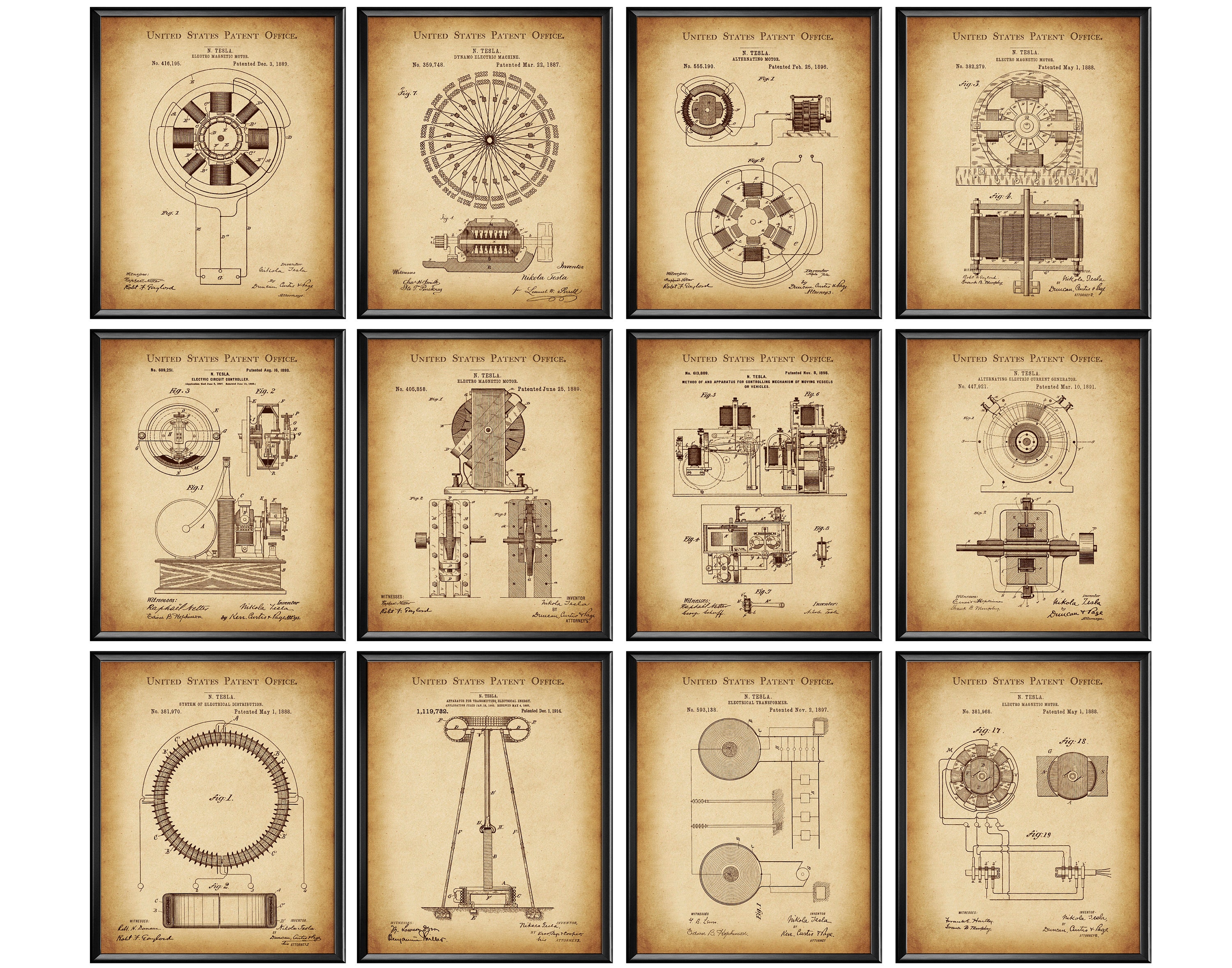
The Visionary Wisdom of Nikola Tesla: Insights and Modern Applications
Introduction
Nikola Tesla, a name synonymous with innovation and brilliance, was an inventor and visionary whose work laid the foundations for much of the modern technology we take for granted today. Born on July 10, 1856, in Smiljan, then part of the Austrian Empire (now Croatia), Tesla displayed extraordinary intellectual abilities from a young age. His education in engineering and physics, coupled with his relentless curiosity and imagination, led to groundbreaking discoveries and inventions that have profoundly shaped our world.
Tesla’s contributions to science and technology are vast and varied. He is perhaps best known for his development of alternating current (AC) electricity, which revolutionized the way we generate and distribute electrical power. His work in electromagnetism and wireless communication paved the way for modern innovations such as radio, remote control, and even the concept of the Internet. Tesla held over 300 patents and his visionary ideas often extended far beyond the technological capabilities of his time.
Despite his monumental achievements, Tesla’s life was marked by financial struggles and a lack of widespread recognition during his later years. Nevertheless, his legacy endures, inspiring generations of scientists, engineers, and dreamers.
The purpose of this article is to delve into some of Tesla’s most famous sayings, exploring the depth of his wisdom and its relevance in today’s world. Tesla’s insights into imagination, the power of the mind, science, and innovation are not only reflective of his own genius but also offer timeless guidance for modern society. By examining these quotes, we can glean valuable lessons on creativity, perseverance, and the pursuit of knowledge, all of which are crucial in our rapidly advancing technological landscape.

Section 1: Imagination and Creativity
Key Sayings:
- “The present is theirs; the future, for which I really worked, is mine.”
- “My brain is only a receiver, in the Universe there is a core from which we obtain knowledge, strength, and inspiration. I have not penetrated into the secrets of this core, but I know that it exists.”
Explanation:
Nikola Tesla’s belief in the power of imagination and creative thinking was foundational to his numerous inventions and groundbreaking theories. The quote, “The present is theirs; the future, for which I really worked, is mine,” reflects Tesla’s confidence that his work would have a lasting impact, even if not immediately recognized. This forward-thinking perspective underscores the importance of visionary ideas and their potential to shape the future.
Tesla also had a profound understanding of the universe as a vast reservoir of knowledge and inspiration, as indicated in his quote, “My brain is only a receiver, in the Universe there is a core from which we obtain knowledge, strength, and inspiration. I have not penetrated into the secrets of this core, but I know that it exists.” This belief in an interconnected cosmos filled with unseen truths drove Tesla’s relentless pursuit of innovation. He saw himself as a conduit for universal knowledge, channeling ideas and insights that could transform humanity.
Modern Implementation:
In today’s tech-driven world, innovation and forward-thinking are more crucial than ever. Tesla’s approach to creativity and imagination provides a valuable blueprint for modern inventors and entrepreneurs. Embracing a visionary mindset, being unafraid to think beyond current limitations, and tapping into the collective knowledge of the universe are strategies that continue to fuel technological advancements.
Examples:
- Elon Musk and SpaceX: Elon Musk, a modern-day visionary, draws clear inspiration from Tesla’s forward-thinking ethos. Musk’s work with SpaceX aims to revolutionize space travel and colonize Mars, ideas that echo Tesla’s belief in working for a future beyond immediate comprehension. Musk’s relentless pursuit of what many considered impossible has led to significant advancements in aerospace technology and renewable energy.
- Steve Jobs and Apple: Steve Jobs, co-founder of Apple, similarly embodied Tesla’s philosophy of imagination and innovation. Jobs’ vision for personal computing and intuitive technology reshaped the tech landscape. His ability to foresee the potential of integrating technology seamlessly into everyday life revolutionized multiple industries, from personal computing to mobile technology. Jobs’ famous belief that “people don’t know what they want until you show it to them” mirrors Tesla’s understanding that the future belongs to those who create it.
By drawing inspiration from Tesla’s approach, modern innovators continue to push the boundaries of what is possible, ensuring that the spirit of imagination and creativity remains a driving force in our technological evolution. The lessons derived from Tesla’s life and work remind us that the future is crafted by those who dare to dream and act on their visionary ideas.
Section 2: The Power of the Mind
Key Sayings:
- “If you want to find the secrets of the universe, think in terms of energy, frequency, and vibration.”
- “Be alone, that is the secret of invention; be alone, that is when ideas are born.”
Explanation:
Nikola Tesla’s perspective on energy, frequency, and vibration reflects his deep understanding of the fundamental principles that govern the universe. He believed that by comprehending these elements, one could unlock the secrets of existence itself. This viewpoint highlights the interconnectedness of all things and suggests that the universe operates on a set of underlying principles that can be deciphered through careful observation and study.
The second quote emphasizes the significance of solitude and focused thinking for creativity and problem-solving. Tesla often worked alone, and he credited his periods of solitude with allowing him to access deeper levels of insight and innovation. He understood that great ideas are often born in moments of quiet reflection, away from the distractions and noise of everyday life.
Modern Implementation:
Tesla’s insights into the power of the mind find numerous applications in today’s world, particularly in the fields of modern physics, quantum mechanics, and mindfulness practices.
Application of Energy and Frequency Concepts:
- Modern Physics and Quantum Mechanics: Tesla’s ideas about energy, frequency, and vibration are foundational to modern physics and quantum mechanics. These fields explore the fundamental nature of reality, where particles and waves interact in complex and often counterintuitive ways. Quantum mechanics, in particular, delves into how particles can exist in multiple states simultaneously and how they interact at the smallest scales, echoing Tesla’s views on the hidden dimensions of the universe.
The Role of Mindfulness and Solitude:
- Meditation Practices in Silicon Valley: In the fast-paced world of technology and innovation, mindfulness and meditation practices have become increasingly popular. Leaders and innovators in Silicon Valley and other tech hubs use these techniques to enhance focus, creativity, and problem-solving abilities. Meditation helps individuals quiet their minds, reduce stress, and access deeper levels of insight, much like Tesla’s periods of solitude allowed him to generate groundbreaking ideas.
- Advancements in Quantum Computing: Quantum computing is a cutting-edge field that applies the principles of quantum mechanics to develop new forms of computation. These computers use qubits, which can represent both 0 and 1 simultaneously, allowing for vastly more powerful processing capabilities compared to classical computers. This technology is revolutionizing fields such as cryptography, material science, and artificial intelligence, demonstrating the practical applications of Tesla’s insights into energy and frequency.
Examples:
- Meditation Practices in Silicon Valley: Companies like Google and Apple have incorporated mindfulness programs to help employees enhance their mental clarity and creativity. Google’s “Search Inside Yourself” program and Apple’s meditation spaces are designed to foster an environment where innovative ideas can flourish.
- Advancements in Quantum Computing: Companies like IBM, Google, and D-Wave are at the forefront of quantum computing research. Google’s quantum computer, Sycamore, achieved quantum supremacy in 2019, performing a complex calculation faster than the world’s most advanced classical supercomputer. These advancements are pushing the boundaries of what is possible, much like Tesla’s visionary work did in his time.
By applying Tesla’s insights into energy, frequency, and vibration, and by recognizing the importance of solitude and focused thinking, modern innovators continue to expand the frontiers of knowledge and technology. Tesla’s legacy lives on in the breakthroughs and discoveries that shape our understanding of the universe and drive human progress.
Section 3: Science and Innovation
Key Sayings:
- “The day science begins to study non-physical phenomena, it will make more progress in one decade than in all the previous centuries of its existence.”
- “I do not think you can name many great inventions that have been made by married men.”
Explanation:
Nikola Tesla’s prediction about the future of science focusing on non-physical phenomena reflects his belief in the untapped potential of exploring the unseen and the intangible. Tesla foresaw that studying areas such as consciousness, telepathy, and other non-physical phenomena could yield groundbreaking advancements, potentially surpassing the progress made through traditional physical sciences.
Tesla’s second quote presents a controversial view on the personal lives of inventors and their impact on innovation. He believed that the intense focus and dedication required for significant breakthroughs often come at the expense of personal relationships. This perspective suggests that the solitude and singular focus that Tesla often practiced were conducive to his innovative success.
Modern Implementation:
Tesla’s insights into the study of non-physical phenomena and the balance between personal life and professional innovation have found resonance in various contemporary fields.
Study of Consciousness and Non-Physical Phenomena:
- Research on Consciousness and AI: Modern science is increasingly exploring the mysteries of consciousness, attempting to understand how subjective experiences arise from neural processes. This research is crucial for the development of artificial intelligence (AI), particularly in creating machines that can mimic human thought and behavior. Projects like the Human Brain Project and initiatives at institutions like the MIT Media Lab are delving into the nature of consciousness and its potential applications in AI.
- Parapsychology: Although still a fringe field, parapsychology investigates phenomena such as telepathy, precognition, and psychokinesis. While these areas remain controversial and lack widespread scientific acceptance, there is ongoing research aiming to explore the boundaries of human potential and the mind’s capabilities.
Balancing Personal Life and Professional Innovation:
- Work-Life Balance Strategies: In today’s high-paced world, balancing personal life and professional innovation is a significant challenge. Innovators and leaders are increasingly aware of the importance of maintaining this balance to sustain long-term productivity and creativity. Companies and individuals are adopting strategies such as flexible working hours, remote work, and wellness programs to support a healthy work-life balance.
Examples:
- Research on Consciousness and AI: Companies like DeepMind and OpenAI are at the forefront of AI research, exploring the intersections of machine learning, neural networks, and consciousness. DeepMind’s AlphaGo and AlphaFold projects have demonstrated the potential of AI to solve complex problems, while OpenAI’s GPT models, including the one powering this text, aim to understand and replicate human-like text generation and understanding.
- Work-Life Balance Strategies for Innovators: Innovative companies like Google, Microsoft, and Facebook have implemented extensive wellness programs, providing employees with resources for mental health, physical well-being, and work-life balance. Initiatives such as Google’s “20% time,” where employees can spend a portion of their workweek on personal projects, encourage creativity and innovation while allowing for personal growth and satisfaction.
By embracing Tesla’s vision of studying non-physical phenomena and finding a balance between personal life and professional pursuits, modern science and industry continue to push the boundaries of what is possible. Tesla’s insights remind us of the importance of exploring the unknown and maintaining the well-being of those who drive innovation, ensuring a future where progress is both profound and sustainable.

Section 4: Life and Purpose
Key Sayings:
- “Life is and will ever remain an equation incapable of solution, but it contains certain known factors.”
- “The desire that guides me in all I do is the desire to harness the forces of nature to the service of mankind.”
Explanation:
Nikola Tesla’s philosophical view of life as a complex equation reflects his understanding of the inherent mysteries and uncertainties of existence. He recognized that while we may never fully solve the “equation” of life, there are certain known factors—principles and truths—that can guide us. This perspective highlights the importance of embracing both the known and the unknown in our quest for knowledge and understanding.
Tesla’s commitment to using science and technology for the betterment of humanity is evident in his second quote. He dedicated his life to harnessing the forces of nature to serve mankind, demonstrating a deep sense of responsibility and altruism. His inventions and ideas were driven by the desire to improve the human condition and advance society.
Modern Implementation:
Tesla’s insights into life and purpose are highly relevant in today’s world, particularly in the context of ethical considerations and the role of technology in addressing global challenges.
Ethical Considerations in Modern Scientific and Technological Advancements:
- Ethical AI and Data Privacy: As technology advances, ethical considerations become increasingly important. The development of artificial intelligence (AI) and data-driven technologies must be guided by principles of fairness, transparency, and privacy. Ensuring that AI systems are unbiased and that individuals’ data is protected is crucial for building trust and promoting the responsible use of technology.
- Bioethics and Genetic Engineering: The rapid progress in genetic engineering and biotechnology raises significant ethical questions. Techniques like CRISPR have the potential to cure genetic diseases but also pose risks of unintended consequences and ethical dilemmas related to genetic modification. Ethical frameworks and regulations are essential to guide research and application in these fields.
The Role of Technology in Addressing Global Challenges:
- Renewable Energy Solutions: In line with Tesla’s vision of harnessing nature’s forces, renewable energy technologies are crucial for addressing climate change and promoting sustainability. Solar, wind, and hydroelectric power are increasingly being adopted worldwide to reduce dependence on fossil fuels and mitigate environmental impact. Innovations in energy storage and smart grids further enhance the efficiency and reliability of renewable energy sources.
- Medical Advancements: Technology continues to drive significant advancements in healthcare, improving diagnosis, treatment, and patient outcomes. Developments in medical imaging, telemedicine, and personalized medicine are transforming healthcare delivery. AI-powered tools are aiding in early detection of diseases, while robotics and minimally invasive surgery techniques enhance precision and recovery times.
- AI for Social Good: AI is being leveraged to address various social challenges, from disaster response to education and poverty alleviation. AI-driven analytics help predict and manage natural disasters, optimize resource allocation in humanitarian efforts, and provide personalized learning experiences in education. By aligning technological innovation with social goals, we can create solutions that benefit society as a whole.
Examples:
- Renewable Energy Solutions: Companies like Tesla, Inc. (named in honor of Nikola Tesla) are at the forefront of renewable energy innovation. Tesla’s solar panels, energy storage solutions, and electric vehicles exemplify the potential of harnessing clean energy for a sustainable future. Initiatives like the Tesla Powerwall and SolarCity aim to make renewable energy accessible and practical for consumers.
- Medical Advancements: Innovations such as the Da Vinci Surgical System, an advanced robotic platform, enable surgeons to perform complex procedures with greater precision and control. AI-driven diagnostic tools like IBM Watson Health analyze vast amounts of medical data to assist doctors in making informed treatment decisions, improving patient care and outcomes.
- AI for Social Good: Projects like Google’s AI for Social Good initiative leverage AI to tackle global challenges. For example, AI is used to predict and monitor wildfires, optimize agricultural practices to combat food insecurity, and enhance accessibility for people with disabilities. These applications demonstrate the transformative potential of AI when aligned with humanitarian objectives.
By adhering to ethical principles and harnessing the power of technology to address global challenges, we can fulfill Tesla’s vision of using science and innovation for the betterment of humanity. Tesla’s insights into life and purpose continue to inspire efforts to create a more just, sustainable, and prosperous world for all.

Section 5: Work and Legacy
Key Sayings:
- “Let the future tell the truth, and evaluate each one according to his work and accomplishments. The present is theirs; the future, for which I have really worked, is mine.”
- “The scientific man does not aim at an immediate result. He does not expect that his advanced ideas will be readily taken up. His work is like that of the planter—for the future. His duty is to lay the foundation for those who are to come and point the way.”
Explanation:
Nikola Tesla’s views on work and legacy reflect a profound understanding of the long-term impact and significance of scientific endeavors. His first quote emphasizes that true evaluation of one’s contributions can only be made by future generations. Tesla recognized that his work might not be immediately appreciated but believed that its true value would be recognized in the long run.
The second quote highlights the patience and foresight required in groundbreaking research. Tesla likened the work of a scientist to that of a planter, who sows seeds for future growth. He understood that advanced ideas often take time to be accepted and that laying a strong foundation is crucial for future advancements. This perspective underscores the importance of perseverance and vision in scientific and technological pursuits.
Modern Implementation:
Tesla’s insights into the importance of legacy and long-term planning continue to inspire contemporary scientists and innovators. The focus on future impact and sustainable progress is evident in various fields today.
The Importance of Legacy and Long-Term Planning:
- Space Exploration Missions: Space exploration epitomizes long-term planning and the pursuit of knowledge for future generations. Missions like NASA’s Artemis program, aiming to return humans to the Moon and eventually send astronauts to Mars, are built on decades of foundational research and development. These missions not only advance scientific understanding but also inspire future generations to explore and innovate.
- Sustainable Development Goals: The United Nations’ Sustainable Development Goals (SDGs) represent a global effort to address pressing challenges such as poverty, inequality, and climate change. Achieving these goals requires long-term commitment and collaboration, mirroring Tesla’s belief in laying the groundwork for future progress. Initiatives under the SDGs aim to create a sustainable and equitable world for future generations.
- Foundational Research in Various Fields: Foundational research, whether in physics, biology, or computer science, often involves exploring uncharted territories with no immediate applications. However, these efforts are crucial for developing the technologies and solutions of tomorrow. For instance, research in quantum computing, gene editing, and artificial intelligence holds the potential to revolutionize industries and improve human life in the coming decades.
Examples:
- Space Exploration Missions: SpaceX, led by Elon Musk, embodies Tesla’s long-term vision with its ambitious plans for space exploration. The company’s development of reusable rockets and its goal of making life multi-planetary align with the idea of planting seeds for future generations. SpaceX’s work is paving the way for sustainable space travel and colonization of other planets.
- Sustainable Development Goals: Organizations and governments worldwide are investing in renewable energy, sustainable agriculture, and education to meet the SDGs. Projects like the Global Alliance for Clean Cookstoves aim to provide clean cooking solutions to millions, improving health outcomes and reducing environmental impact. These efforts reflect the long-term planning and foresight essential for sustainable development.
- Foundational Research in Various Fields: The Human Genome Project, completed in 2003, is an example of foundational research with far-reaching implications. Mapping the human genome has opened up new possibilities in personalized medicine, genetic therapy, and biotechnology. Similarly, research in quantum computing by companies like IBM and Google is laying the groundwork for future breakthroughs in computation and problem-solving.
Tesla’s legacy of visionary thinking and dedication to the future serves as a guiding light for modern innovators. By valuing long-term impact and laying strong foundations, we can continue to advance science and technology in ways that benefit future generations, honoring Tesla’s belief in the enduring power of knowledge and innovation.

Conclusion
Summary of Tesla’s Wisdom and Its Relevance to Modern Society
Nikola Tesla’s wisdom, captured through his profound sayings, offers timeless insights into the power of imagination, the mind, and the importance of a long-term vision. Tesla’s belief in the transformative power of creativity, the interconnectedness of energy and vibration, the value of solitude for innovation, the ethical application of technology, and the enduring impact of one’s work provides a guiding framework for modern society. His forward-thinking approach continues to inspire today’s inventors, scientists, and entrepreneurs to push boundaries and think beyond the present.
Encouragement for Readers to Apply Tesla’s Insights in Their Own Lives and Careers
Tesla’s insights are not just historical musings but practical guidelines for anyone aiming to make a significant impact. Readers are encouraged to embrace creativity and imagination in their endeavors, recognizing that innovation often comes from thinking beyond current limitations. By valuing periods of solitude and focused thought, individuals can enhance their problem-solving abilities and foster creativity. Ethical considerations and a commitment to long-term impact should guide our use of technology, ensuring that advancements serve the greater good and address global challenges.
Final Thoughts on the Enduring Legacy of Nikola Tesla
Nikola Tesla’s legacy is one of relentless pursuit of knowledge, unwavering dedication to improving humanity, and visionary thinking that transcended his time. His work laid the foundation for numerous technological advancements that continue to shape our world. Tesla’s life and ideas remind us that true innovation requires both a deep understanding of fundamental principles and a bold vision for the future. As we continue to navigate the complexities of modern society, Tesla’s legacy serves as a beacon of inspiration, urging us to harness our knowledge and creativity for the betterment of all.
The MEDA Foundation is dedicated to fostering innovation, supporting scientific research, and promoting sustainable development. By encouraging the application of Tesla’s principles, the foundation aims to create a world where technological advancements are used to solve pressing global challenges and improve quality of life for all. Through its initiatives, the MEDA Foundation is nurturing the next generation of innovators and ensuring that Tesla’s legacy of visionary thinking and commitment to humanity endures.
Reading References
- “Tesla: Inventor of the Electrical Age” by W. Bernard Carlson – A comprehensive biography that delves into Tesla’s life, inventions, and impact on the modern world.
- “Wizard: The Life and Times of Nikola Tesla” by Marc J. Seifer – An in-depth look at Tesla’s personal and professional life, providing context for his visionary ideas.
- “The Innovators: How a Group of Hackers, Geniuses, and Geeks Created the Digital Revolution” by Walter Isaacson – A broader exploration of innovation and the impact of visionaries like Tesla on modern technology.
- “Quantum Computing Since Democritus” by Scott Aaronson – A resource for understanding the principles of quantum mechanics and computing, areas influenced by Tesla’s insights into energy and frequency.
- “The Age of Em: Work, Love, and Life when Robots Rule the Earth” by Robin Hanson – A thought-provoking look at the future of AI and robotics, reflecting the long-term vision that Tesla championed.










